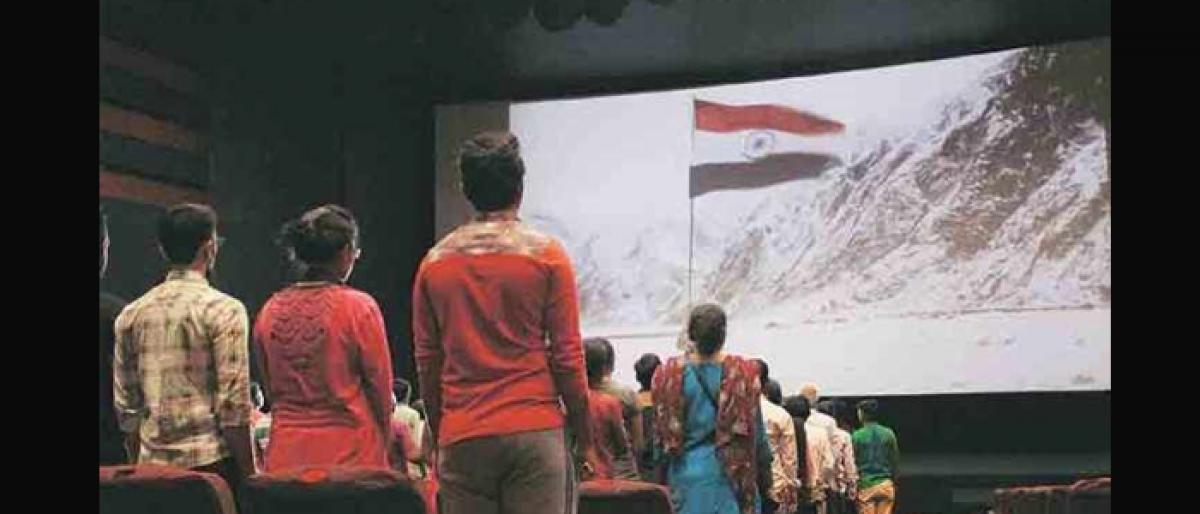Live
- BJP MP candidate Bharat Prasad visited the student who tried to commit suicide
- PM’s popularity in the fast lane: Autos with 'Har Dil Mein Modi' slogan spotted across Delhi
- Delhi-based political parties are like East India Company: Sukhbir Badal
- Golf: Diksha moves into Top-20 at South African Women’s Open
- KCR lashes out against BJP and Congress for destroying Telangana
- Dairy Science students visited the Milk cooling plant
- Moody feels Pant ahead in keepers’ race for T20 WC squad; Srikkanth picks Rahul over Samson as reserve keeper
- Thanking voters for extending 'unparalleled support' to NDA, PM Modi says second phase 'too good'
- Natural Relief for Menstrual Cramps: Beetroot Juice Recipe
- Asha Worker died in a road accident
Just In

Suppose Big B asks a question on KBC - When was the last time you sang the national anthem or stood when it was being played? I am sure most of the participants would fumble and may not be able to answer even after using their lifelines. It is so because it has disappeared from our routine after we left school.
Suppose Big B asks a question on KBC - When was the last time you sang the national anthem or stood when it was being played? I am sure most of the participants would fumble and may not be able to answer even after using their lifelines. It is so because it has disappeared from our routine after we left school.
We stand in queue for hours together to buy a ticket of a movie of our favourite hero and if don’t get it from across the counter we don’t hesitate to buy it in black.
Even if the movie is boring, we continue to sit in the theatre for three hours and to beat the boredom we munch popcorn and sip soft drinks despite the fact that the rates are exorbitantly high. But then why are we cribbing to stand up for 52 seconds when the full version of the national anthem is played? Where does the question of moral policing creep in? Why are we reading too much into it?
It seems much ado about nothing is taking place over the issue. Since the usage of the word international practices is the latest fad, let’s take a quick look at the practices in the countries like USA, Japan, Italy or Thailand.
The Japanese, who have had a rocky relationship with overt displays of nationalism since World War II, passed a law that officially established their national flag and anthem only in 1999. In 2003, Tokyo passed a regulation that required school or board officials to record the names of teachers who did not stand and sing the national anthem. The anthem, Kimigayo, is a solemn song about Japan’s emperor.
More than 500 teachers in Tokyo have been disciplined for refusing to stand and sing the national anthem. Some have lost their jobs while others were let off with warnings. Some of the other sanctions include re-education courses and pay cuts.
In Italy, the national anthem isn’t played at schools or other public places, except during sporting events, at formal state ceremonies and at public rallies attended by the President. No one is required to sing along or behave in some particular way while the national anthem is being played. However, Italians are required to stand and show respect to any national anthem.
Thailand’s love for its anthem is more fervid than most. It is played every day on television at 8 am and 6 pm. Students of all ages gather in front of the national flag at 8 am and sing the national anthem together. The national anthem is also played regularly in government offices, and before movie screenings. However, there is no law regarding the national anthem in Thailand. It’s just an unofficial convention.
The convention in the United States is pretty clear: When the national anthem is being played, whether or not the American flag is displayed, all individuals should face the flag/ the source of music and stand at attention with the right hand over their hearts. But the United States does not discipline its citizens for failing to stand up.
This being the practice across the globe why should we be so impatient. Is there really a need to make it a political issue and seek the intervention of the court? The common man should ponder and decide.

© 2024 Hyderabad Media House Limited/The Hans India. All rights reserved. Powered by hocalwire.com







